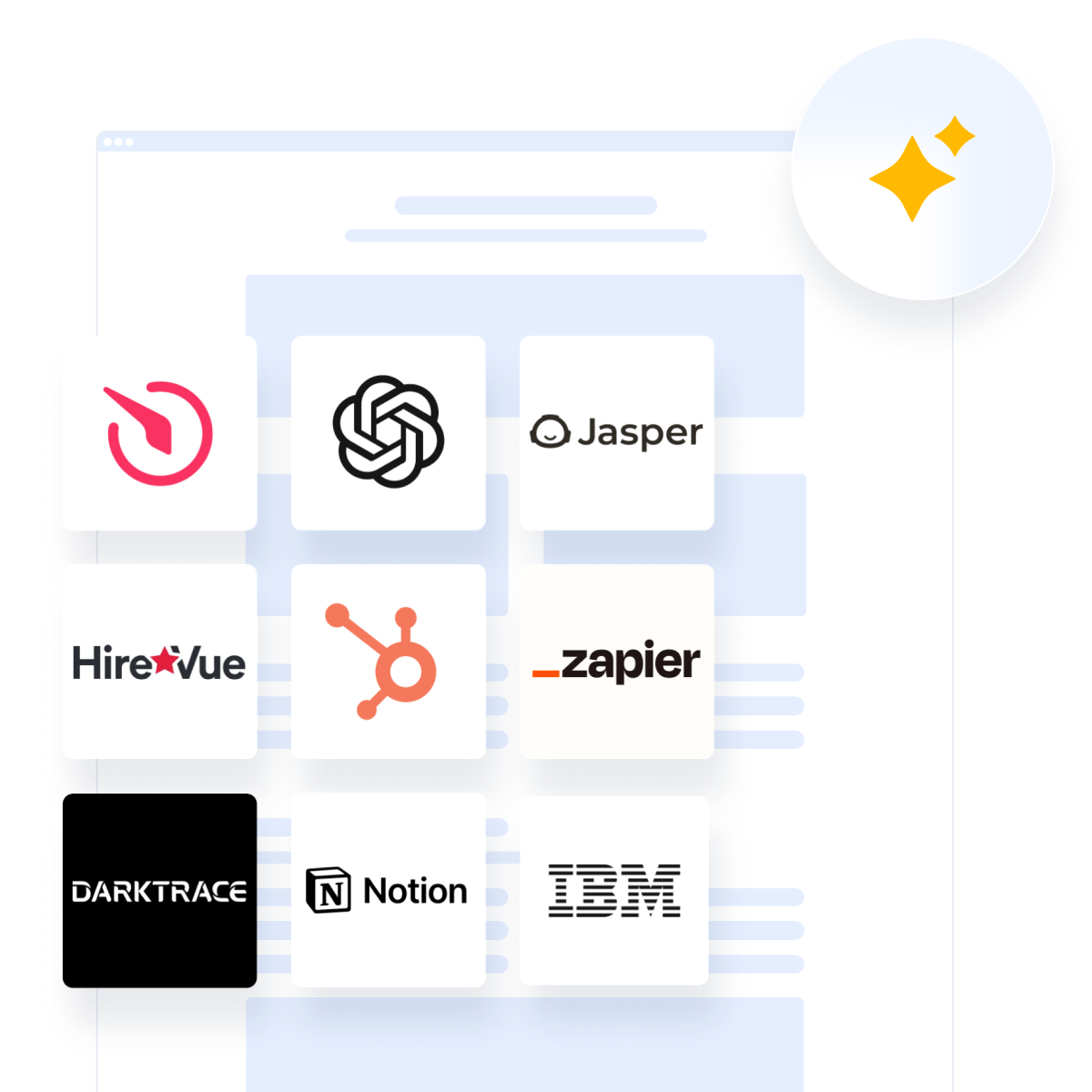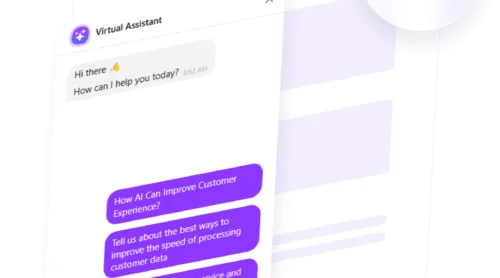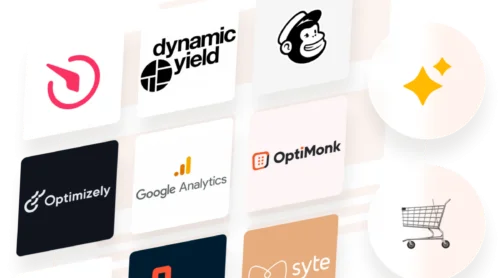Artificial intelligence is transforming the way businesses operate, driving efficiency, automation, and smarter decision-making across industries. From customer service chatbots to AI-driven analytics, businesses of all sizes are leveraging AI tools to enhance productivity, reduce operational costs, and gain a competitive edge.
As the technology continues to evolve, AI applications in business are becoming more diverse and accessible. In this article, we’ll explore the 12 best AI tools for business. We’ll also discuss how to choose the right AI tool for your business, and highlight future AI trends that will shape industries in the coming years.
Top AI Tools for Business: Comparison Table
AI tools are transforming businesses across industries, automating processes, enhancing decision-making, and improving customer interactions. Whether it’s for customer support, marketing, data analytics, HR, or cybersecurity, AI-powered solutions help businesses work smarter and more efficiently.
Here’s the quick overview of the best AI tools we’ll cover in our article.
| AI tool | Category | Key features | Pricing |
|---|---|---|---|
| Elfsight AI Chatbot | Conversational AI & Chatbots | No-code setup, pre-built templates, multi-channel support, customizable personality, AI-driven learning | Free plan; paid plans start at $5/month |
| ChatGPT | Conversational AI & Chatbots | Advanced NLP, customizable API, multi-turn conversations, adaptive responses, multi-language support | Free version; ChatGPT Plus: $20/month |
| Jasper AI | AI for Marketing & Content Creation | AI-driven content generation, 50+ writing templates, tone customization, SEO optimization, multi-language support | Starter: $39/month; Boss Mode: $59/month |
| Grammarly | AI for Marketing & Content Creation | Grammar/spell check, tone analysis, plagiarism detection, real-time feedback, AI-based rewriting suggestions | Free version; Premium: $12/month; Business plan: $15/user per month |
| IBM Watson | AI for Data Analytics & Business Intelligence | NLP, predictive analytics, data visualization, integration with enterprise systems, AI-driven business forecasting | Custom pricing |
| HireVue | AI for HR & Recruitment | Video interview analysis, automated candidate assessments, real-time hiring analytics, ATS integration | Custom pricing |
| HubSpot AI | AI for Sales & CRM Automation | Lead scoring, automated email personalization, chatbot integration, predictive sales analytics | Free basic CRM; Premium plans start at $45/month |
| Salesforce Einstein | AI for Sales & CRM Automation | Predictive lead scoring, customer insights, automated task management, chatbot and virtual assistant capabilities | Custom pricing |
| Darktrace | AI for Cybersecurity & Risk Management | Anomaly detection, autonomous threat response, cloud/on-premise security, continuous learning for evolving threats | Custom pricing |
| Microsoft Defender | AI for Cybersecurity & Risk Management | AI-driven threat detection, cloud-based analytics, endpoint protection, integration with Microsoft 365 security tools | Starts at $3/user per month |
| Notion AI | AI for Workflow & Productivity | AI-assisted writing, smart search, automated note-taking, task automation, team workflow integration | Free basic plan; Premium starts at $8/month |
| Zapier AI | AI for Workflow & Productivity | Connects 5,000+ apps, no-code workflow builder, smart task automation, custom integrations with APIs | Free plan; Premium starts at $19.99/month for advanced features |
AI-Powered Chatbots & Customer Support
AI chatbots are redefining customer service by enabling businesses to provide 24/7 support, instant responses, and personalized interactions at scale. These AI-driven assistants can handle customer inquiries, resolve issues, and automate workflows, significantly reducing operational costs.
1. Elfsight AI Chatbot – Website Chat Support
Elfsight AI Chatbot widget is a user-friendly chatbot solution designed to help businesses integrate an AI-powered assistant into their websites with minimal effort. This platform is perfect for companies that want a simple yet powerful tool to enhance user interaction, engage visitors, answer frequently asked questions and more.
This easy-to-use chatbot is fully customizable, allowing businesses to create automated conversations and interactions that align with their brand’s voice. The tool is designed for businesses that are looking for a cost-effective way to streamline communication, improve customer experience, and drive sales growth.
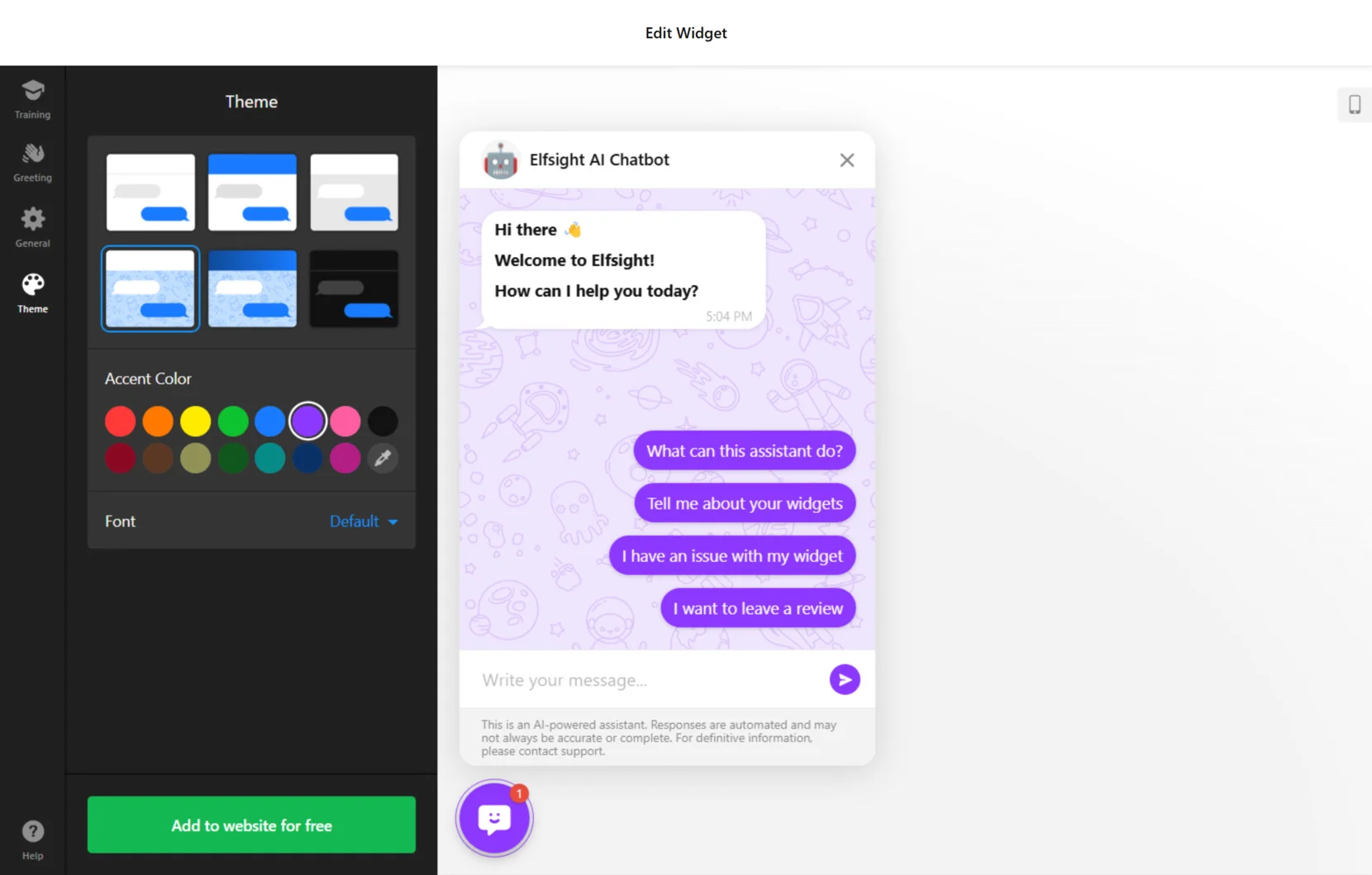
Key features:
- No-code setup. Easily create and launch your chatbot using a drag-and-drop interface, with no coding required.
- Pre-built templates. Choose from ready-made chatbot templates tailored to various industries and use cases.
- AI-powered learning. The chatbot improves over time by learning from previous interactions and optimizing responses.
- Lead capture. Collect and qualify leads by gathering contact information directly through chatbot conversations.
- Multilingual support. Engage global customers with multi-language support for a personalized experience.
Best for: Small businesses, e-commerce, service-based industries, and website owners who need a cost-effective, easy-to-implement AI chatbot solution for customer engagement.
Build your own AI Chatbot to drive business success!
2. ChatGPT – Conversational AI & Chatbots
ChatGPT, developed by OpenAI, is a powerful conversational chatbot capable of generating human-like responses, assisting in customer service, and enhancing business communications. It integrates with multiple platforms, making it a versatile tool for businesses looking to streamline customer interactions.
With its advanced natural language processing, ChatGPT can handle complex queries and provide personalized experiences. Whether for customer support, sales assistance, or content generation, this tool offers businesses a seamless way to engage customers and improve operational efficiency.
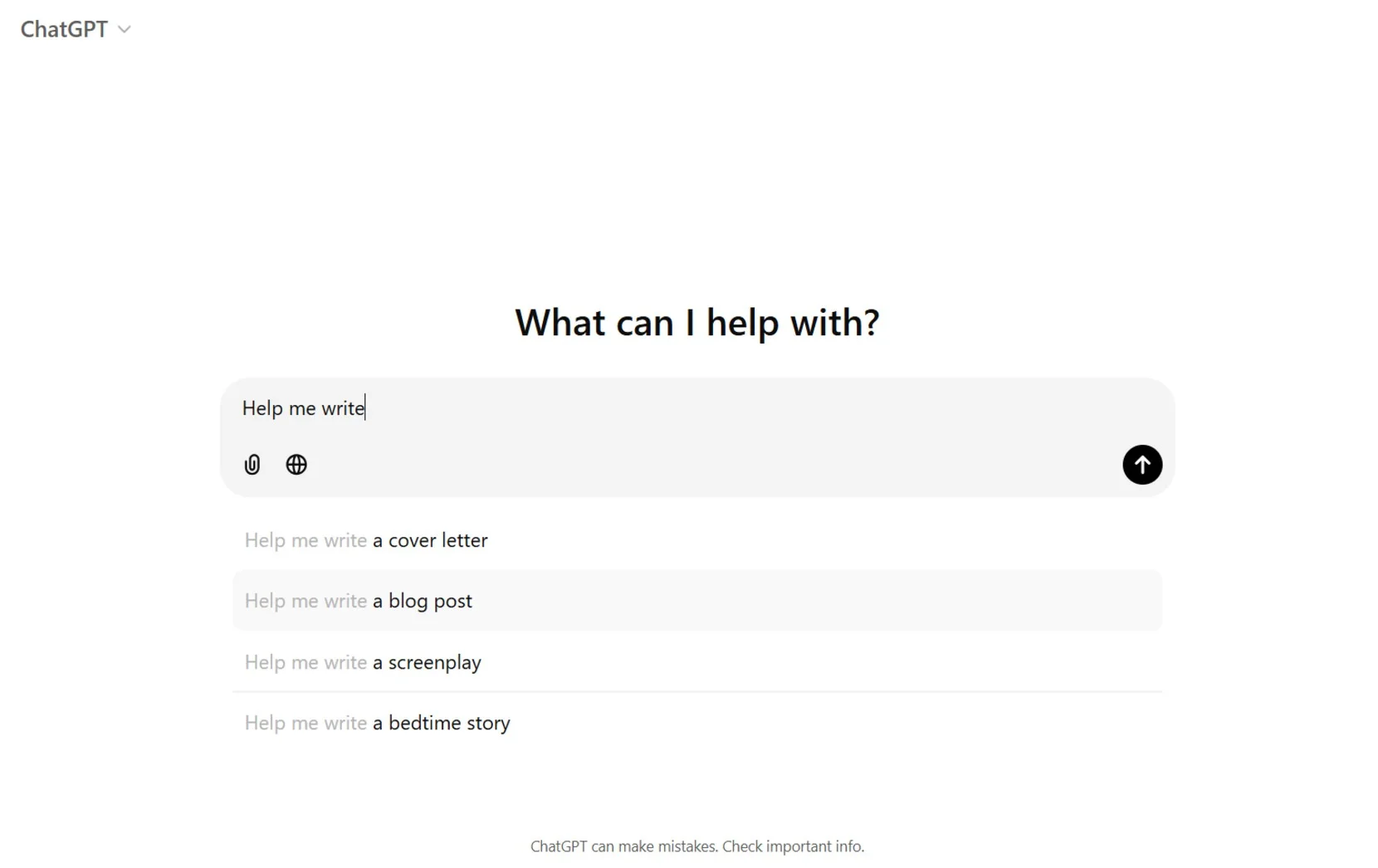
Key features:
- Advanced NLP capabilities. ChatGPT understands natural language inputs, making conversations feel more human-like and engaging.
- Customizable API integration. Businesses can integrate ChatGPT into websites, customer support systems, and CRM platforms for seamless interaction.
- Multi-turn conversation support. The AI remembers context within a conversation, providing more coherent and relevant responses.
- Personalized and adaptive responses. The chatbot learns from interactions, improving response accuracy and user experience over time.
- Multi-language support. ChatGPT can communicate in various languages, making it ideal for global businesses.
Best for: E-commerce, SaaS businesses, and customer service teams seeking scalable, AI-driven chatbot solutions.
AI for Marketing & Content Creation
AI is revolutionizing marketing by automating content creation, optimizing ad campaigns, and enhancing audience targeting. These tools help businesses produce high-quality content efficiently, improving engagement and conversion rates.
3. Jasper AI – AI Copywriting & Content Generation
Jasper AI is a leading AI-powered writing tool designed to help businesses create compelling blog articles, marketing copy, ad content, and more. Using machine learning, it generates human-like text that aligns with specific brand tones and industry needs.
The intuitive interface allows users to quickly generate high-quality content, saving time and effort in content creation. Jasper also offers a range of templates and customizable options, making it ideal for businesses of all sizes looking to scale their content marketing efforts efficiently.
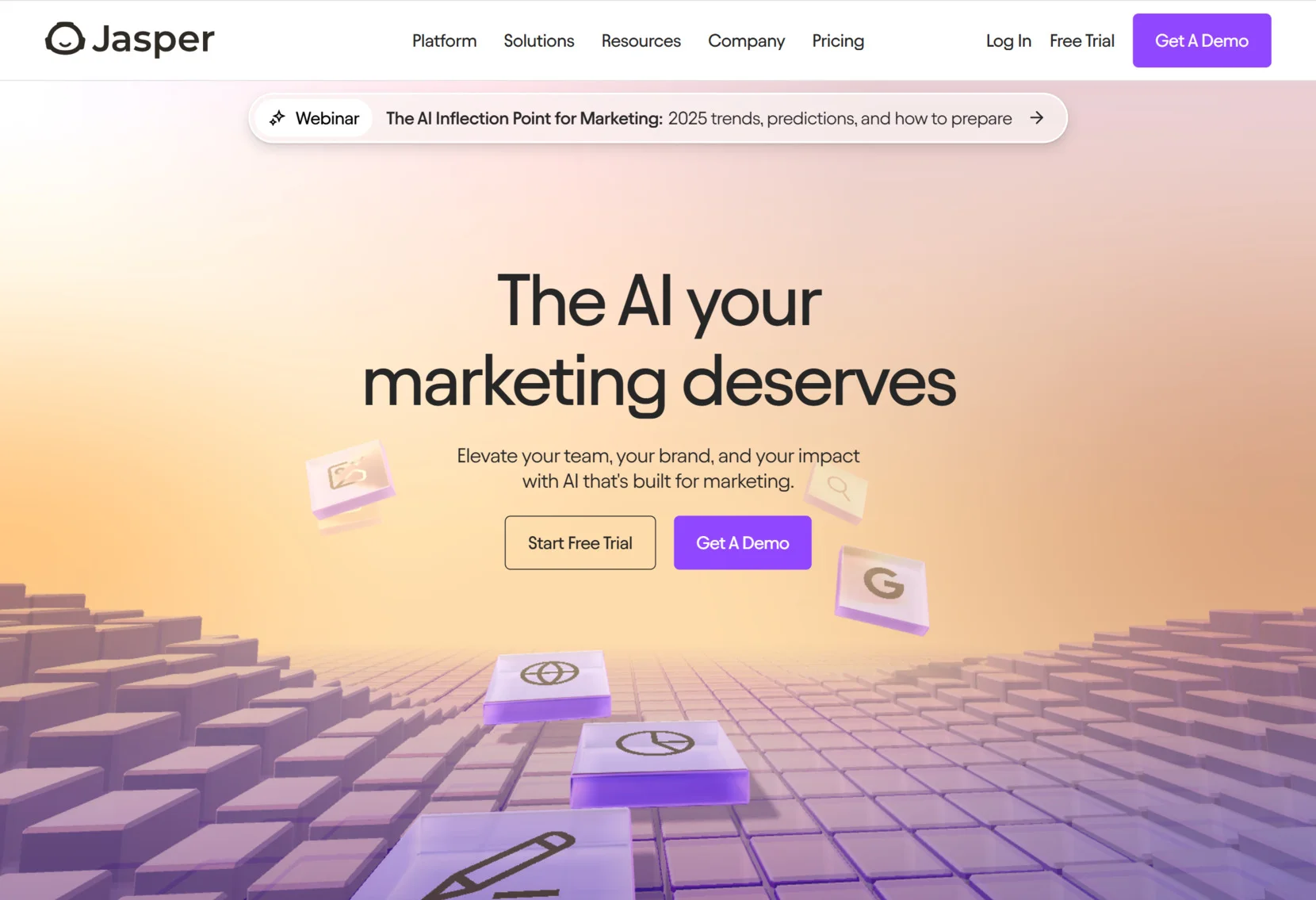
Key features:
- AI-driven content generation. Jasper AI creates high-quality articles, social media posts, and marketing materials in seconds.
- Over 50+ writing templates. The tool offers pre-set templates for different content types, including ads, emails, and website copy.
- Tone customization. Businesses can adjust the writing style to match their brand’s personality and target audience.
- SEO optimization. The integration helps improve content SEO rankings by analyzing keywords and text structure.
- Multi-language support. Jasper AI generates content in multiple languages, broadening its usability for global brands.
Best for: Content marketers, bloggers, and agencies looking for scalable, AI-powered content creation.
4. Grammarly – AI-Powered Writing Assistant
Grammarly is an AI-driven writing assistant that helps professionals, businesses, and students improve grammar, clarity, and overall writing quality. Unlike traditional spell-checkers, this tool provides real-time feedback on tone, engagement, and sentence structure.
The assistant also offers personalized suggestions to enhance readability and ensure that your content resonates with the intended audience. Whether you’re drafting emails, reports, or marketing copy, Grammarly helps you produce polished, error-free content, improving communication efficiency across all written materials.
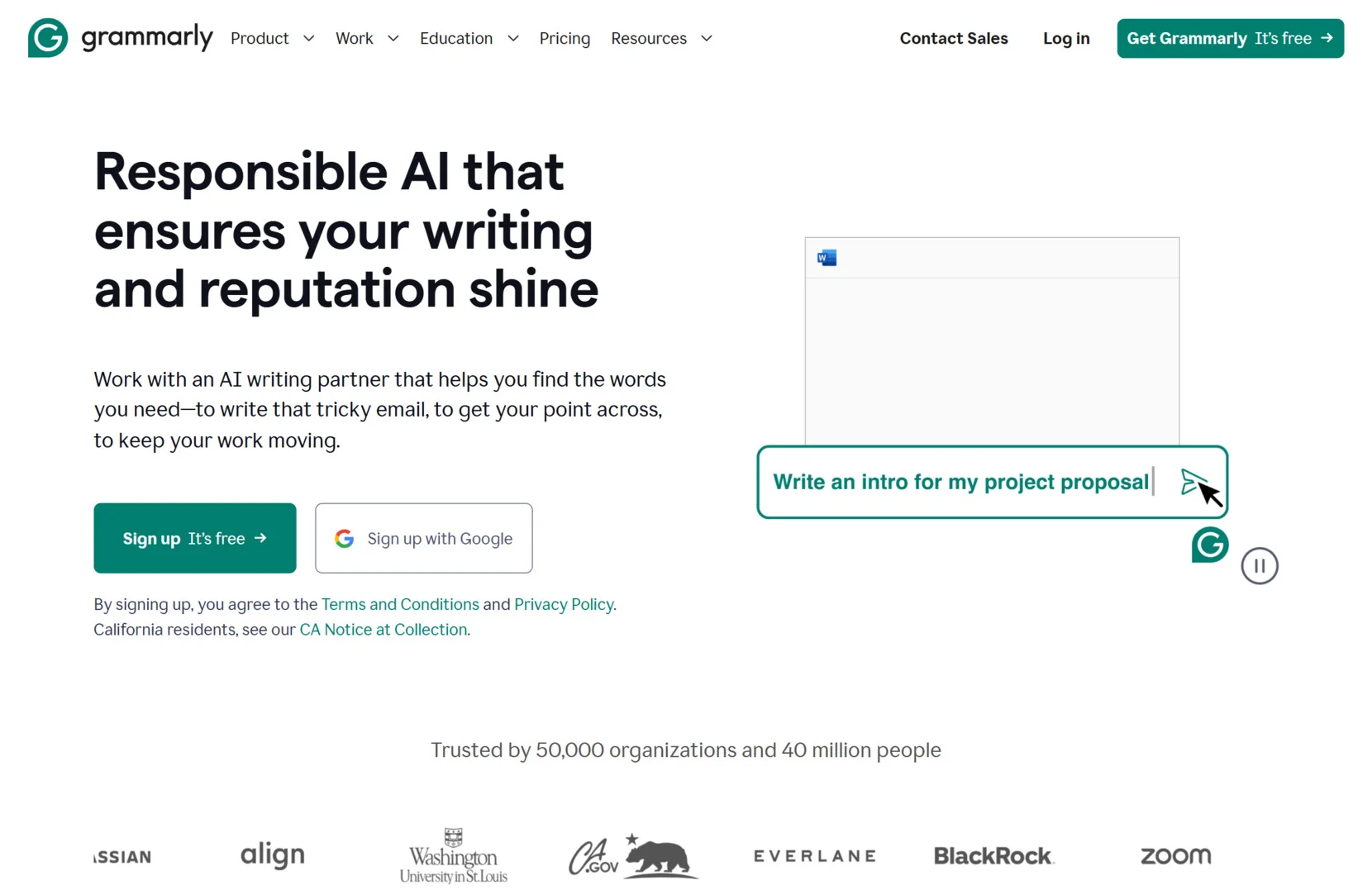
Key features:
- Grammar, punctuation, and spell-checking. Grammarly uses AI to identify and correct grammar, punctuation, and spelling errors, ensuring your writing is polished and accurate.
- Tone analysis. It analyzes the tone of your writing to help ensure that your communication matches the intended mood or professionalism.
- Plagiarism detection. Grammarly checks your content for plagiarism by comparing it to billions of web pages, helping you ensure your work is original.
- Real-time feedback. Integrated with platforms like emails, Google Docs, and Microsoft Word, Grammarly provides instant feedback as you write, allowing for immediate corrections.
- AI-based rewriting suggestions. Grammarly suggests ways to rewrite sentences for better clarity and conciseness, improving the overall flow and readability of your writing.
Best for: Writers, marketers, professionals, and teams who want error-free, polished writing, and those looking for an AI tool to enhance communication clarity and professionalism.
AI for Data Analytics & Business Intelligence
AI-powered analytics and business intelligence tools are transforming how organizations process large volumes of data. These solutions use artificial intelligence to uncover patterns, predict trends, and optimize decision-making. By automating data analysis and visualization, businesses can gain deeper insights and react faster to changes in the market. AI tools in this category help organizations stay competitive by making sense of complex data and improving operational efficiency.
5. IBM Watson – AI-Powered Business Insights
IBM Watson offers powerful AI-driven analytics and business intelligence solutions designed for large enterprises. With capabilities in natural language processing (NLP) and predictive analytics, Watson helps businesses uncover valuable insights from massive datasets. By integrating with existing enterprise systems, Watson ensures that data flows seamlessly across teams. The platform helps decision-makers visualize data, predict future trends, and make informed choices based on real-time insights.
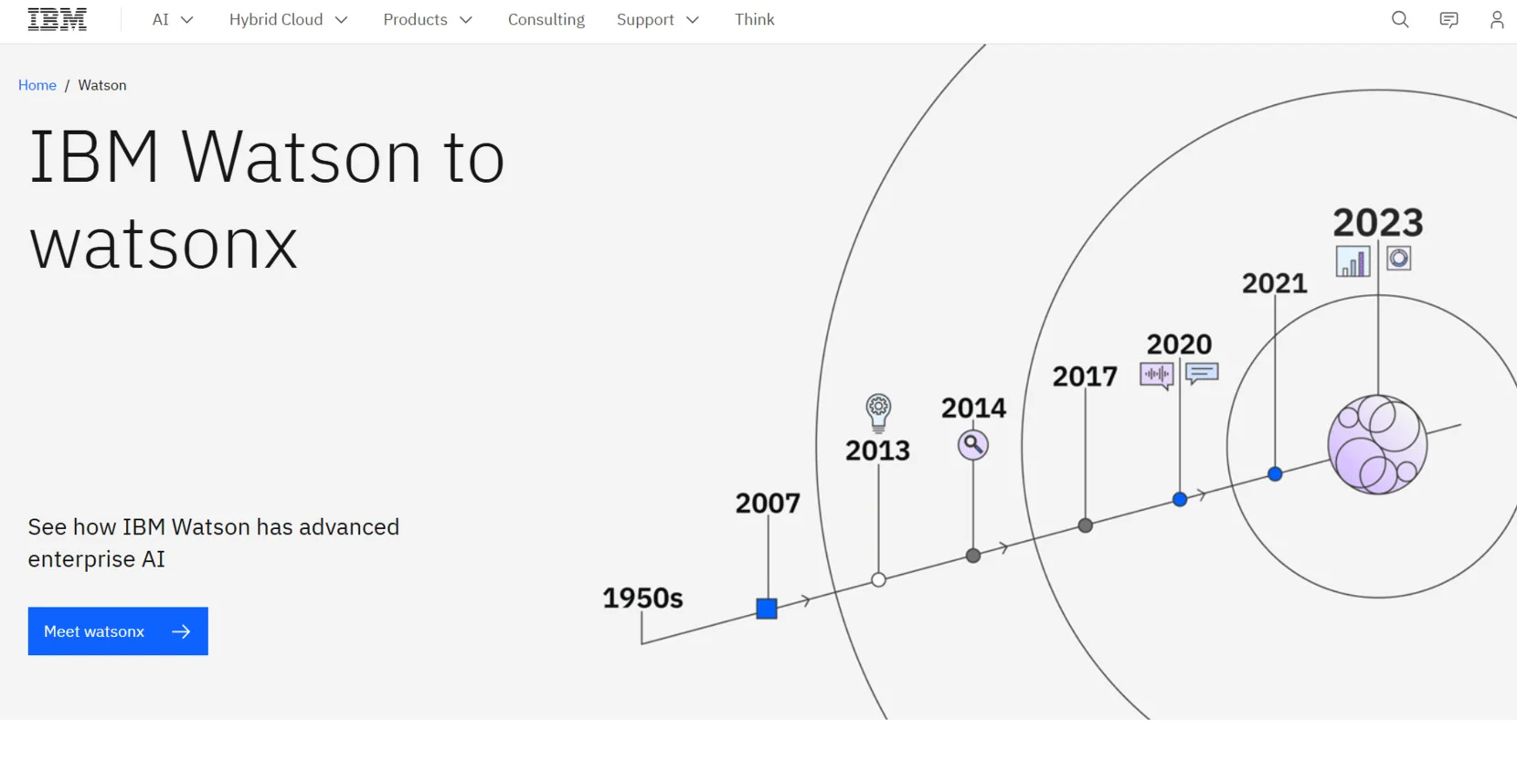
Key features:
- Advanced natural language processing (NLP). Watson’s NLP capabilities allow users to interact with data in a more natural, human-like way, improving accessibility and ease of use.
- Predictive analytics. Watson uses AI to predict trends and forecast outcomes, enabling better planning and more informed decisions.
- AI-powered data visualization. The platform automatically turns complex data into clear, easy-to-understand visualizations, making it easier for users to spot trends and patterns.
- Integration with enterprise systems. Watson integrates with existing enterprise software, ensuring smooth collaboration across departments and more efficient data processing.
Best for: Enterprises, data analysts, and finance teams looking for advanced business intelligence solutions.
AI for HR & Recruitment
AI tools in HR and recruitment have significantly improved how companies source, assess, and hire talent. These platforms automate repetitive tasks, improve candidate matching, and help reduce biases in the hiring process. By utilizing machine learning and natural language processing, AI recruitment tools can evaluate candidates’ skills and cultural fit more efficiently. As companies scale their hiring efforts, AI solutions provide the scalability and speed needed to keep up with growing demands.
6. HireVue – AI for Hiring & Candidate Screening
HireVue leverages AI to enhance the hiring process, analyzing video interviews to assess candidates’ potential for specific roles. It automates the evaluation of candidate responses, allowing recruiters to quickly identify top talent. The platform’s real-time analytics offer insights into hiring trends, which can help HR teams refine their strategies. With integration into applicant tracking systems (ATS), HireVue streamlines the hiring process from start to finish.
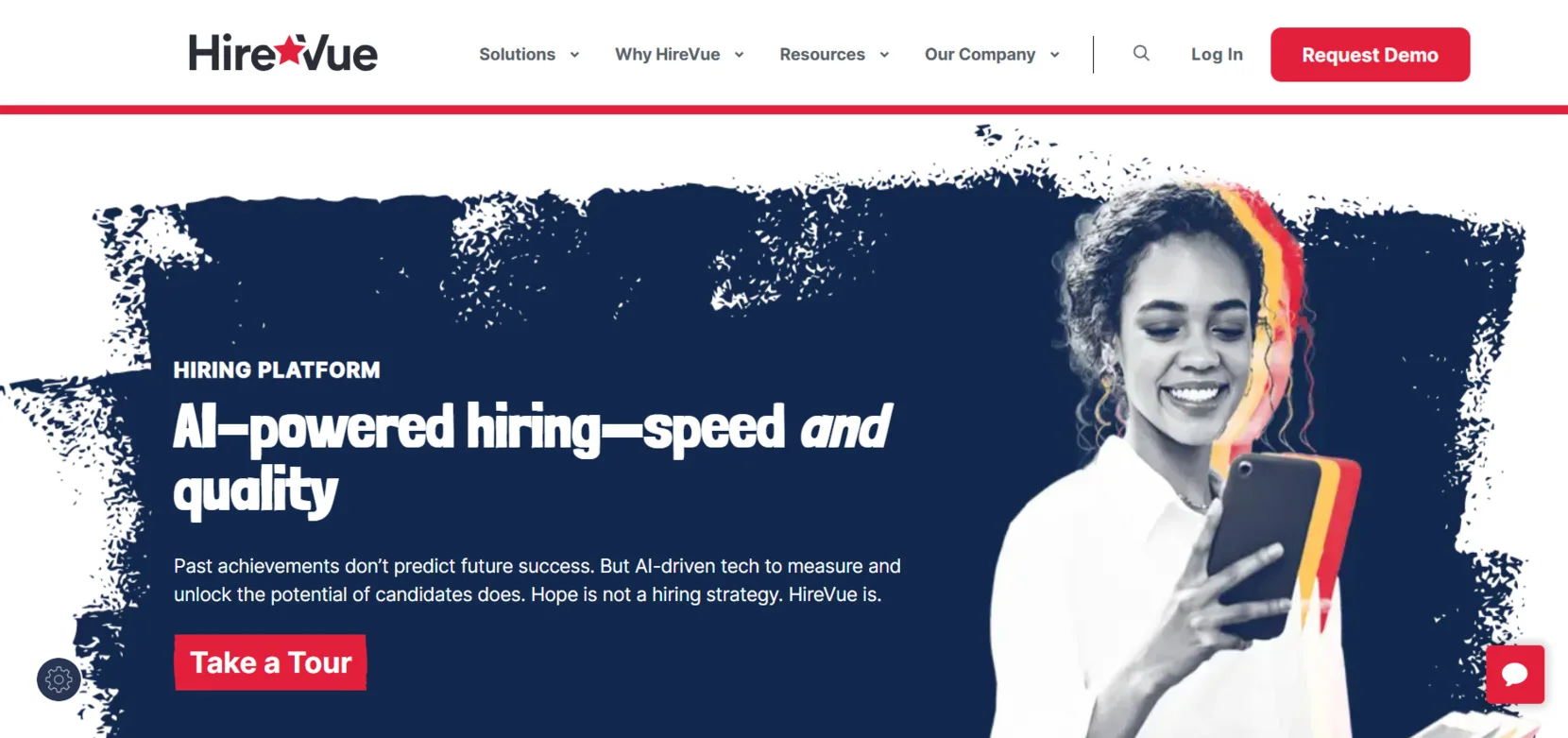
Key features:
- AI-powered video interview analysis. The AI analyzes video responses, evaluating both verbal and non-verbal cues, offering deeper insights into candidate personality and suitability.
- Automated candidate assessments. HireVue automates the candidate evaluation process, making it easier for recruiters to assess skills, experience, and cultural fit objectively.
- Real-time analytics on hiring rrends. Provides data-driven insights into hiring patterns, helping HR teams optimize their recruitment strategies.
- Integrates with applicant tracking systems (ATS). The tool integrates seamlessly with existing ATS platforms, ensuring that candidate data is automatically updated.
Best for: HR teams, recruiters, and enterprises with high hiring volumes seeking to automate candidate screening.
AI for Sales & CRM Automation
AI tools in sales and CRM automation are reshaping how businesses manage customer relationships. These solutions help companies score leads, forecast sales, and provide personalized outreach at scale. By analyzing customer data and behavior, AI-driven platforms can predict the likelihood of a sale, helping sales teams prioritize leads effectively. These tools also automate repetitive tasks, allowing sales reps to focus on building relationships and closing deals more efficiently.
7. HubSpot AI – AI-Driven CRM & Sales Automation
HubSpot AI enhances CRM automation by using AI-powered lead scoring, predictive analytics, and personalized outreach to optimize sales processes. It helps sales teams prioritize leads based on their likelihood to convert, ensuring that reps focus on high-value prospects. HubSpot’s seamless integration with marketing tools creates a unified platform for managing customer interactions and data. With its AI features, HubSpot enables sales teams to increase efficiency, close more deals, and improve customer engagement.
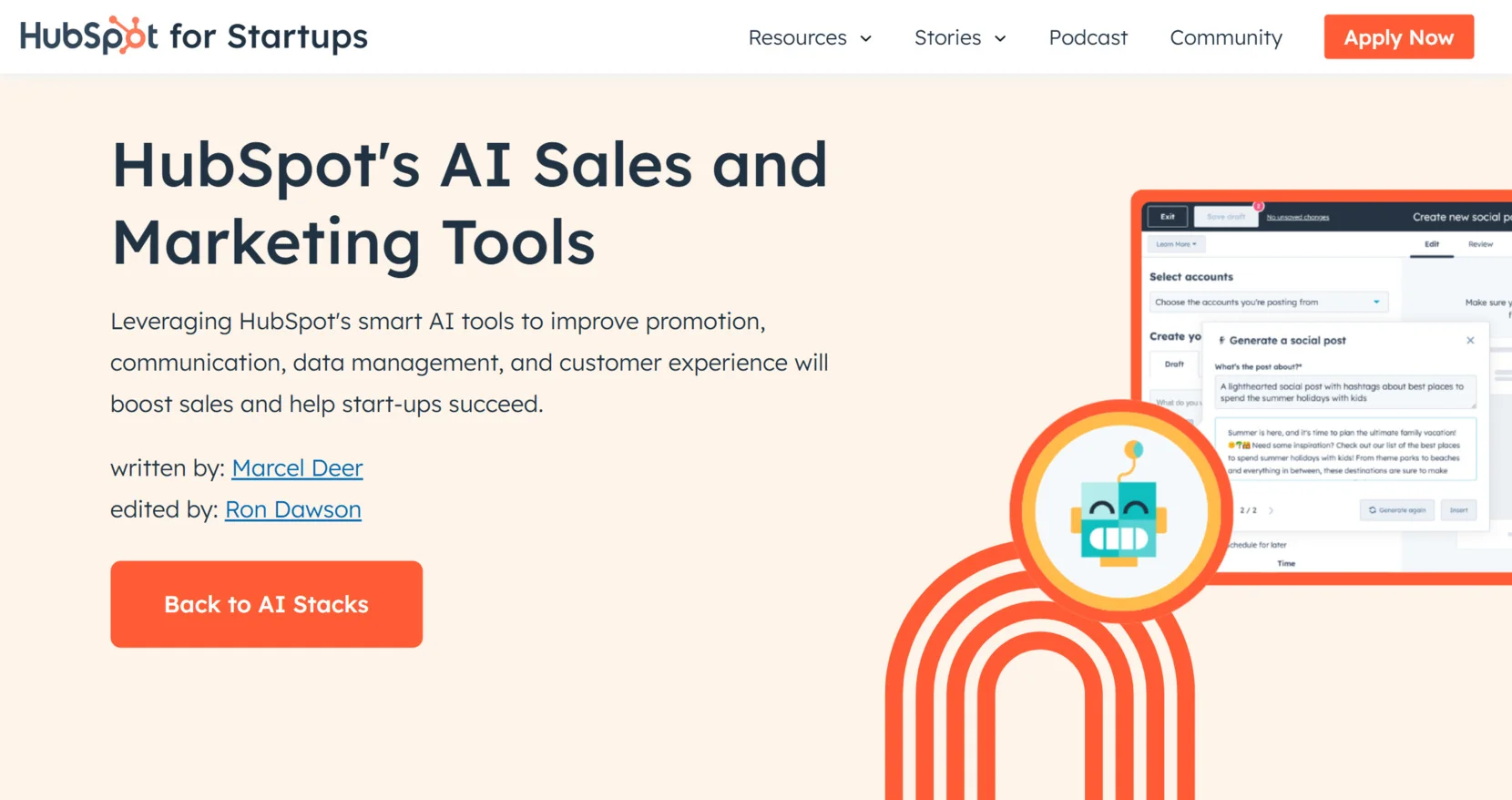
Key features:
- AI-driven lead scoring and segmentation. Automatically ranks leads based on their potential to convert, allowing sales teams to focus on the most promising prospects.
- Automated sales email personalization. Personalizes sales emails at scale, ensuring that each message feels relevant and tailored to the recipient.
- Chatbot integration for customer interactions. HubSpot’s AI-powered chatbots automate customer interactions, providing quick responses and guiding prospects through the sales funnel.
- Predictive sales analytics. Uses AI to forecast sales trends, helping teams prioritize leads and predict outcomes more accurately.
Best for: Sales teams, startups, and growing businesses looking to automate CRM processes and improve sales performance.
8. Salesforce Einstein – AI-Powered CRM Intelligence
Salesforce Einstein is a robust AI tool designed to enhance Salesforce’s CRM capabilities by delivering predictive insights and automating workflows. With its AI-driven lead scoring, customer insights, and task management features, Einstein helps sales teams prioritize leads and streamline their daily operations. By providing real-time analytics and forecasting, it empowers businesses to make data-driven decisions and boost sales productivity. Its integration with the broader Salesforce ecosystem allows for seamless interaction across departments, helping businesses provide a consistent customer experience.
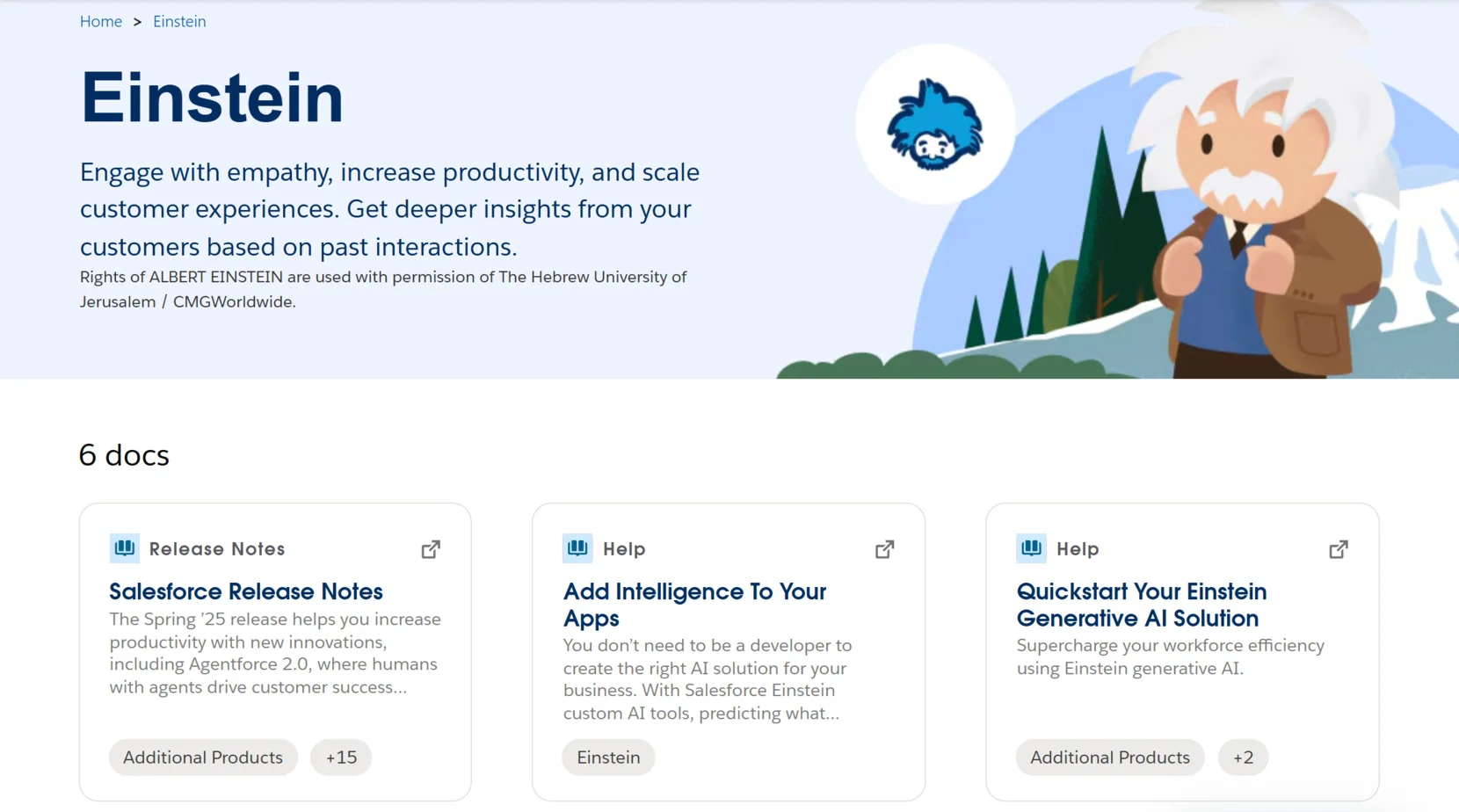
Key features:
- Predictive lead scoring. Einstein uses AI to evaluate leads, helping sales teams focus on high-quality prospects who are most likely to convert.
- AI-driven customer insights. The platform gathers customer data from all touchpoints and provides actionable insights into customer behavior and preferences.
- Automated task management. Automates routine sales tasks, allowing sales reps to spend more time engaging with prospects and closing deals.
- Chatbot and virtual assistant capabilities. Einstein includes AI-powered chatbots and virtual assistants that can handle customer inquiries and provide support, enhancing customer experience.
Best for: Large enterprises and B2B sales teams looking for predictive insights and advanced CRM automation.
AI for Cybersecurity & Risk Management
AI plays a critical role in cybersecurity by providing real-time threat detection, automated response, and predictive risk management. These tools leverage machine learning and anomaly detection to monitor network traffic, identify potential vulnerabilities, and respond autonomously to security breaches. In the face of growing cyber threats, AI-driven cybersecurity tools help organizations protect sensitive data, maintain compliance, and minimize the impact of attacks. They ensure proactive defense against evolving cyber risks, enabling faster mitigation of threats.
9. Darktrace – AI for Cyber Threat Detection
Darktrace is a leading AI-powered cybersecurity platform that uses machine learning to detect and respond to cybersecurity threats in real time. The platform continuously monitors network activity, identifying anomalies that may indicate potential threats.
The self-learning capabilities allow it to adapt to new threats without human intervention, offering proactive protection against ever-evolving cyber risks. With its autonomous response system, Darktrace can take immediate action to contain and neutralize threats, minimizing the damage from cyberattacks.

Key features:
- AI-powered anomaly detection. Darktrace uses machine learning to detect unusual patterns in network activity, alerting teams to potential security breaches in real-time.
- Autonomous response to threats. The platform can automatically respond to detected threats by isolating infected systems, preventing further damage.
- Cloud and on-premise security integration. Darktrace integrates with both cloud and on-premise systems, providing comprehensive security across hybrid environments.
- Continuous learning for evolving threats. The AI system learns from new data to adapt to emerging threats, improving detection capabilities over time.
Best for: Enterprises, cybersecurity teams, and financial institutions requiring advanced threat detection and rapid response capabilities.
10. Microsoft Defender – AI-Powered Security
Microsoft Defender is a comprehensive AI-driven security solution designed to protect organizations from cybersecurity threats. It integrates seamlessly with Microsoft 365 and provides AI-powered threat detection, cloud-based security analytics, and endpoint protection.
Defender uses machine learning to identify and mitigate potential risks, offering proactive protection across devices, emails, and network activities. Its integration with the broader Microsoft ecosystem enables a unified security approach, making it an ideal solution for businesses using Microsoft products.
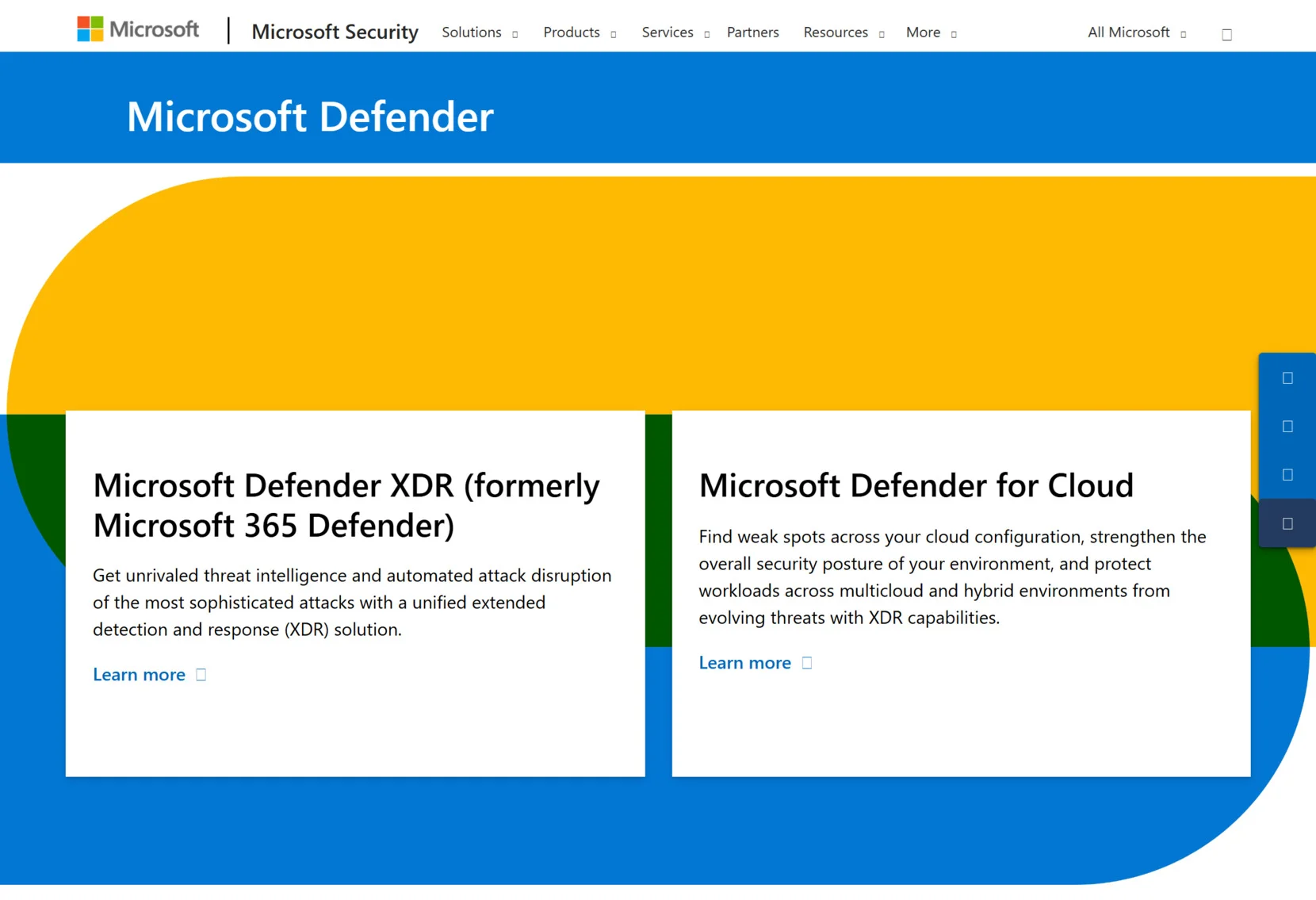
Key features:
- AI-driven threat detection. Microsoft Defender uses AI to analyze data and identify potential threats before they become serious security issues.
- Cloud-based security analytics. The platform offers cloud-based analytics to help organizations monitor and respond to security events in real time.
- Endpoint protection. Defender provides protection across all endpoints, including devices, applications, and network access points, ensuring a comprehensive security approach.
- Integration with Microsoft 365 security suite. Defender integrates fully with Microsoft 365’s security tools, offering centralized management and a streamlined security experience.
Best for: Businesses using Microsoft 365, IT security teams, and organizations seeking an integrated security solution.
AI for Workflow & Productivity
AI tools in workflow and productivity are designed to help businesses automate tasks, streamline operations, and improve overall efficiency. These platforms use AI to analyze workflows, suggest improvements, and automate repetitive processes. By reducing manual effort, businesses can focus on high-value activities like strategy development and creative work. AI-driven productivity tools also enhance collaboration by providing smart search functionalities, content suggestions, and task management features.
11. Notion AI – AI-Powered Productivity & Knowledge Management
Notion AI enhances productivity by offering AI-powered content suggestions, task automation, and smart search capabilities. The platform is widely used by remote teams, project managers, and content creators to organize tasks, manage knowledge, and improve collaboration. Notion’s AI features help streamline workflows, making it easier to find relevant information, automate note-taking, and generate ideas. The tool is ideal for teams seeking to improve efficiency and maintain a centralized knowledge base.
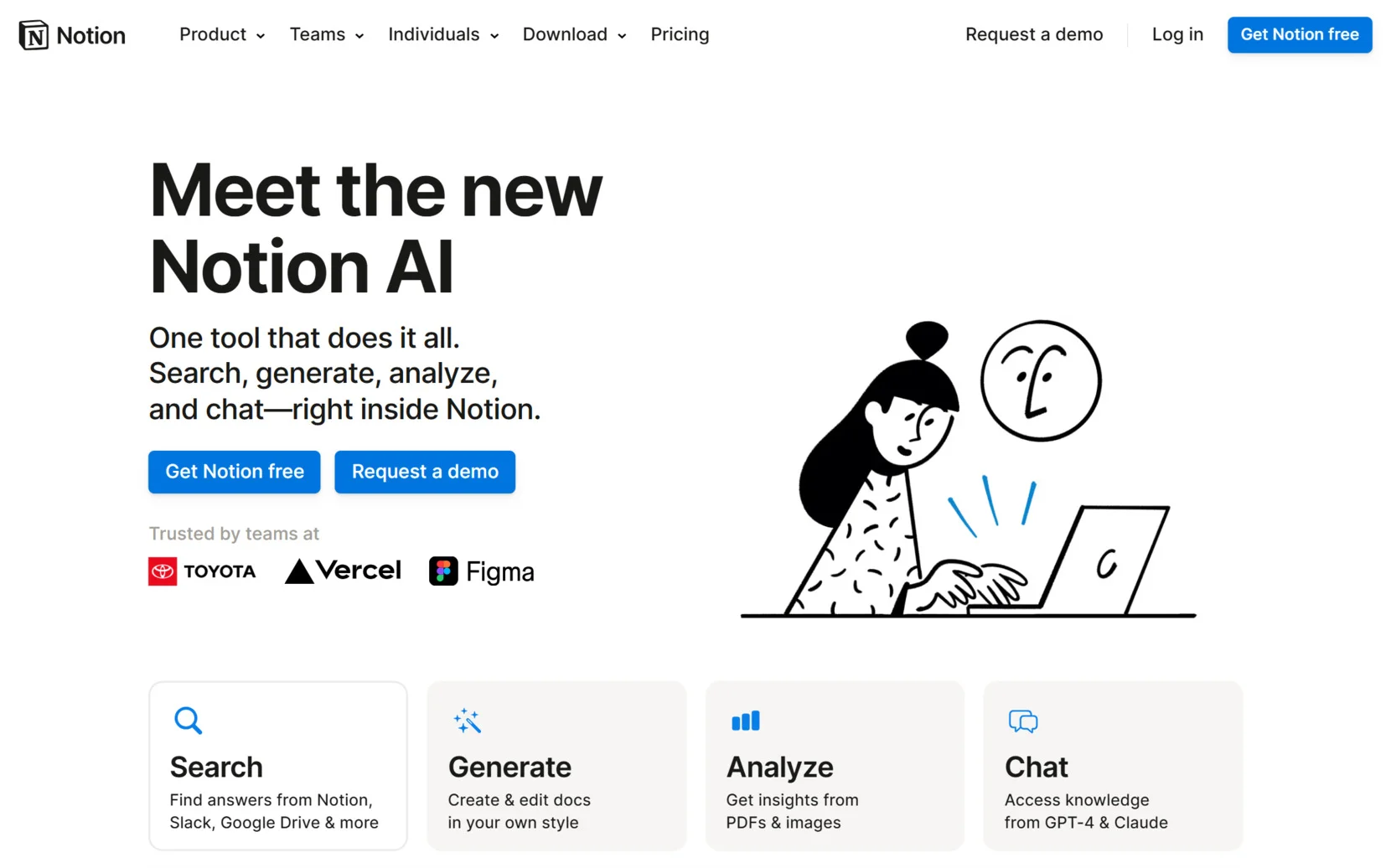
Key features:
- AI-assisted writing and brainstorming. Notion AI assists with content generation, helping users write more efficiently and brainstorm new ideas faster.
- Smart search and organization tools. The AI-powered search function helps users find relevant information quickly, making task and project management more efficient.
- Automated note-taking and documentation. Notion automates the creation of meeting notes and documentation, saving time for teams and ensuring important details are captured.
- Integration with team workflows. Notion integrates smoothly with team workflows, enhancing collaboration and making it easier to manage projects in a centralized hub.
Best for: Remote teams, project managers, and content creators seeking AI-powered productivity tools.
12. Zapier AI – AI-Powered Workflow Automation
Zapier AI automates workflows by connecting over 5,000 apps and services, allowing businesses to streamline their processes and reduce manual work. The platform is designed to trigger actions between different business tools based on user-defined rules. With no-code setup, even non-technical users can automate tasks such as lead tracking, email marketing, and customer support workflows. Zapier’s AI features enhance these workflows by learning from user behavior and offering smarter automation options.
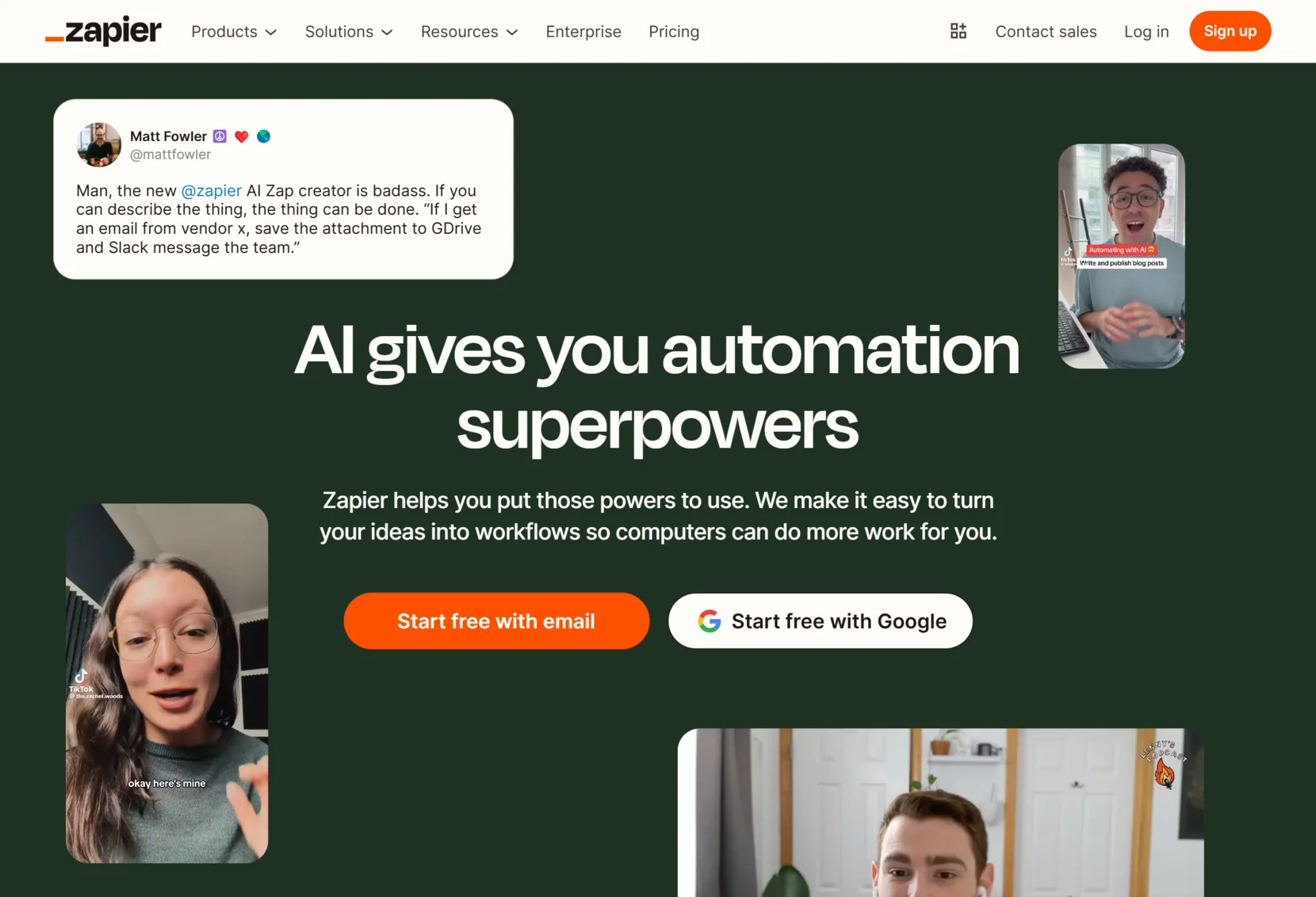
Key features:
- AI-driven automation across apps. Zapier AI connects a vast range of apps and automates workflows, allowing users to integrate tools without needing coding expertise.
- No-code workflow builder. Users can create custom workflows with a simple drag-and-drop interface, making it accessible to non-technical teams.
- Smart task automation. The AI optimizes task automation by learning from usage patterns, making workflows more efficient over time.
- Custom integrations with APIs. Zapier allows businesses to create custom integrations with various APIs, giving them flexibility in automating complex workflows.
Best for: Businesses looking to streamline processes and integrate a wide variety of apps.
How to Choose the Right AI Tool for Your Business
When choosing AI tools for your business, it’s essential to focus on your company’s specific needs and objectives. The right tool should align with your goals and seamlessly integrate with your existing operations to enhance efficiency, improve customer engagement, or generate actionable insights. Here’s a step-by-step guide with suggestions on how to select AI tools based on different business needs:
Identify Your Business Needs
- Customer support. If your primary goal is to improve customer service and support, Elfsight AI Chatbot is a great option. It provides no-code chatbot integration for easy setup on your website, making it perfect for businesses looking to engage visitors, answer frequently asked questions, and collect leads.
- Content creation. For businesses needing assistance in generating high-quality marketing copy, blog posts, or advertisements, Jasper AI is a strong contender. Its ability to create human-like content tailored to different industries and tones makes it ideal for marketers and content creators.
- Writing & editing. If improving the quality of written content is a priority, Grammarly is an excellent AI-powered writing assistant. It provides real-time feedback on grammar, clarity, engagement, and tone, ensuring that your business communications remain professional and polished.
Define the Scope of Automation Needed
- Sales & CRM automation. If automating sales processes and enhancing customer relationship management is your priority, HubSpot AI is a valuable tool. It helps businesses track leads, personalize communications, and automate follow-up tasks, streamlining the sales pipeline.
- Customer relationship insights. For businesses looking to derive actionable insights from customer interactions and behaviors, Salesforce Einstein offers AI-powered CRM intelligence. It helps businesses better understand customer needs, predict behaviors, and personalize interactions.
- Workflow automation. If your focus is on automating tasks across different business functions to improve productivity, Zapier AI stands out. It connects various applications to automate workflows, ensuring that your team’s time is spent on more strategic tasks.
Consider Security & Risk Management
- Cybersecurity & threat detection. If protecting your business from potential cyber threats is critical, Darktrace and Microsoft Defender provide AI-powered security features. Darktrace uses machine learning to detect unusual activities in your network, while Microsoft Defender offers advanced protection against a wide range of threats.
- AI for risk management. For businesses concerned with data-driven insights for risk management and business intelligence, IBM Watson can help. It provides AI-powered analytics, enabling businesses to gain deeper insights into operations and identify potential risks before they escalate.
Look for Recruitment & Talent Management Solutions
- Hiring & candidate screening. If streamlining your recruitment process is your top priority, HireVue is an AI-powered hiring platform that helps businesses assess candidates more effectively through video interviews and predictive analytics. This tool makes the hiring process more efficient, reducing time-to-hire and improving the quality of hires.
Evaluate Your Data-Driven Needs
- Business insights & analytics. If your business requires deeper insights into data for decision-making, IBM Watson is a robust AI-powered analytics tool that helps businesses harness the power of data to make informed decisions and improve operations.
- Knowledge management & productivity. If your team struggles with managing knowledge and enhancing productivity, Notion AI can be a game-changer. It helps organize notes, tasks, and documents, streamlining workflows and making knowledge sharing more efficient across the organization.
Focus on Simplicity and Usability
- Ease of setup. For businesses with limited technical expertise, tools like Elfsight AI Chatbot offer no-code setups with drag-and-drop functionality, making it easy for anyone to get started without needing a technical background. This is perfect for small businesses or startups with limited resources.
- Scalability. Consider how well the AI tool can grow with your business. For example, Salesforce Einstein is scalable and can evolve as your CRM needs become more complex.
Integration with Existing Systems
- Multi-platform integration. Make sure the tool can integrate with your existing business systems and platforms. Tools like HubSpot AI, Salesforce Einstein, and Zapier AI are excellent for businesses that rely on multiple software solutions and need seamless integrations to automate and streamline operations.
Consider Budget and ROI
- Cost-effective solutions. For businesses looking for cost-effective AI solutions, Elfsight AI Chatbot and Grammarly are great starting points. They offer powerful features at a reasonable price, allowing smaller businesses to implement AI without breaking the bank.
- Return on investment. Consider how the AI tool can improve efficiency and reduce costs. Tools like Zapier AI and Salesforce Einstein can provide excellent ROI by automating tasks, improving customer relationships, and streamlining workflows.
Choosing the right AI tool for your business is a critical decision. By carefully evaluating your business needs — whether it’s customer engagement, content creation, workflow automation, or data insights — you can select a solution that fits your objectives. With thoughtful consideration of your goals and resources, you’ll be able to choose the AI tools that drive success for your business.
Why Use AI Tools in Businesses
As AI technologies continue to evolve, their impact grows, offering businesses the ability to optimize operations, enhance customer experiences, and make data-driven decisions. From automating routine tasks to providing deep insights, AI tools are helping businesses adapt to a fast-paced, ever-changing environment.
Here are the key benefits of AI tools for businesses:
🤖 Automation of repetitive tasks
AI tools excel at automating repetitive and time-consuming tasks, allowing businesses to free up valuable human resources for more strategic activities. From managing administrative duties to automating data entry and report generation, AI can handle a variety of tasks, reducing human error and increasing operational efficiency. This results in time savings, faster execution of processes, and a reduction in labor costs.
📈 Enhanced data-driven decision-making
AI tools enable businesses to analyze vast amounts of data and derive meaningful insights in real-time. By applying machine learning and predictive analytics, AI can identify trends, patterns, and correlations in complex datasets that might otherwise go unnoticed. This empowers businesses to make informed decisions based on data, improving accuracy and reducing reliance on gut feelings or intuition.
🤝 Improved customer experience
AI enhances customer service and experience by enabling personalized, efficient interactions. With the ability to analyze customer data, AI tools can predict customer needs, provide tailored recommendations, and offer support around the clock. Whether through personalized marketing, responsive chatbots, or intelligent customer service systems, AI helps businesses build stronger, more engaging relationships with their customers.
💰 Cost savings and efficiency gains
AI tools drive cost savings by improving efficiency and reducing waste. Automation leads to faster processing times, fewer errors, and optimized workflows, all of which contribute to cost reductions. Furthermore, AI can help identify inefficiencies in supply chains, production processes, and customer service, allowing businesses to take proactive steps to streamline operations and cut unnecessary expenses. In many cases, the initial investment in AI tools is quickly offset by the operational savings they provide.
Future Trends in AI for Business
The future of artificial intelligence (AI) in business is both exciting and transformative. As AI continues to evolve, it will become even more integral to operations, innovation, and decision-making across industries. From generative AI to predictive analytics, the future holds immense potential for businesses that harness these advancements. By understanding emerging trends, businesses can better position themselves to take advantage of AI’s growing capabilities and drive long-term success.
Emerging AI Trends
| Trend | Description |
|---|---|
| Generative AI & Automation | Generative AI creates new content (e.g., text, images, music), revolutionizing creative industries like marketing and design. Combined with automation, AI handles complex tasks like data extraction and decision-making, improving efficiency. |
| AI-Driven Personalization in Marketing | AI enhances personalization by analyzing consumer data in real-time to deliver hyper-targeted campaigns, product recommendations, and dynamic pricing. This results in better customer engagement and higher conversion rates. |
| AI in Predictive Analytics & Decision-Making | AI analyzes historical data to predict future outcomes with higher accuracy, empowering businesses to make proactive decisions. This trend supports industries like finance, retail, and supply chain management with improved forecasting. |
| AI for Sustainability & Green Business Practices | AI helps businesses reduce environmental impact by optimizing energy use, improving supply chain efficiency, and supporting circular economy practices. AI is crucial in promoting sustainability in sectors like energy, manufacturing, and logistics. |
How Businesses Can Prepare for Upcoming AI Advancements
To stay ahead of the curve and take advantage of the latest AI advancements, businesses need to begin by understanding the potential impact AI can have on their specific industry. Here are several ways businesses can prepare for the future of AI:
- Stay informed and invest in research & development (R&D). Businesses should remain informed about the latest trends and breakthroughs in AI. Investing in R&D will allow organizations to experiment with new technologies and identify innovative ways to integrate AI into their operations. Partnering with AI research firms, universities, or startups can also provide valuable insights into upcoming developments.
- Focus on data collection and quality. AI’s capabilities are only as good as the data it processes. Businesses should prioritize gathering high-quality, relevant data and ensure it is clean and well-organized. Investing in data infrastructure and analytics platforms can help unlock the full potential of AI tools.
- Prepare the workforce for AI integration. As AI becomes more integrated into business processes, it is crucial to train employees in AI literacy and provide opportunities for reskilling. Businesses should foster a culture of innovation where employees can learn about AI technologies and leverage them in their roles. Training workers in both AI and soft skills will create a workforce that is prepared for AI-driven transformation.
- Invest in scalable AI solutions. To keep pace with future advancements, businesses should seek AI solutions that are scalable and flexible. As new AI technologies emerge, businesses need to be able to adapt quickly and integrate these tools into their existing systems. Choosing AI tools that can grow with your business will ensure long-term success and minimize the risk of obsolescence.
FAQ
Is ChatGPT still the best AI?
Are AI tools expensive?
Can AI tools replace human jobs?
How secure are AI tools in handling business data?
How do I integrate AI tools into my existing workflow?
Conclusion
The rise of AI technology is reshaping the business landscape, enabling companies to automate processes, enhance decision-making, and deliver more personalized customer experiences. By understanding the wide range of AI solutions for business and how they align with specific goals, organizations can strategically adopt these tools to improve efficiency, reduce costs, and drive innovation.


